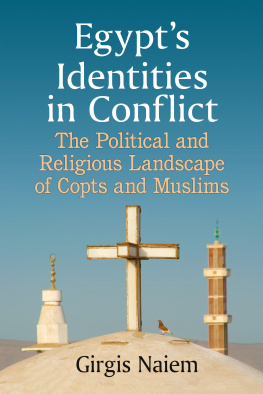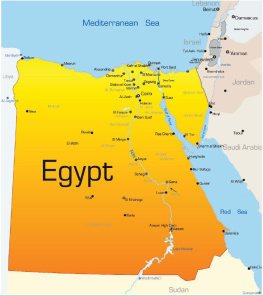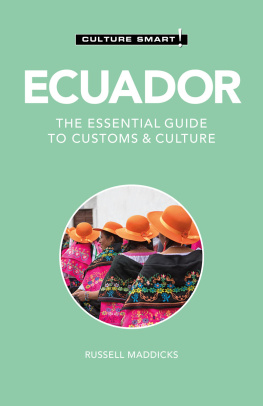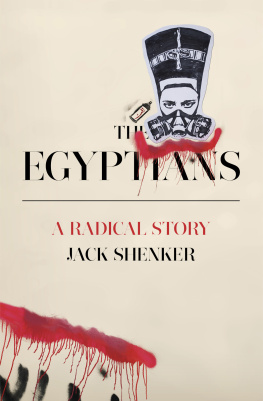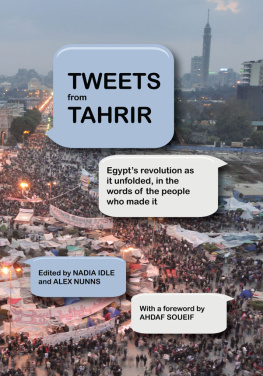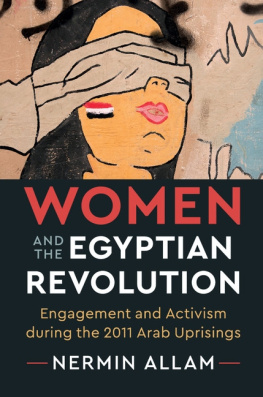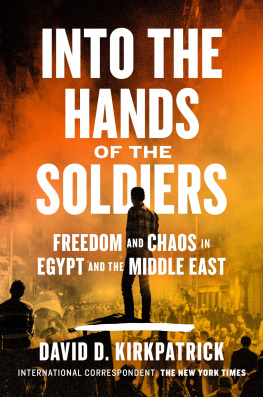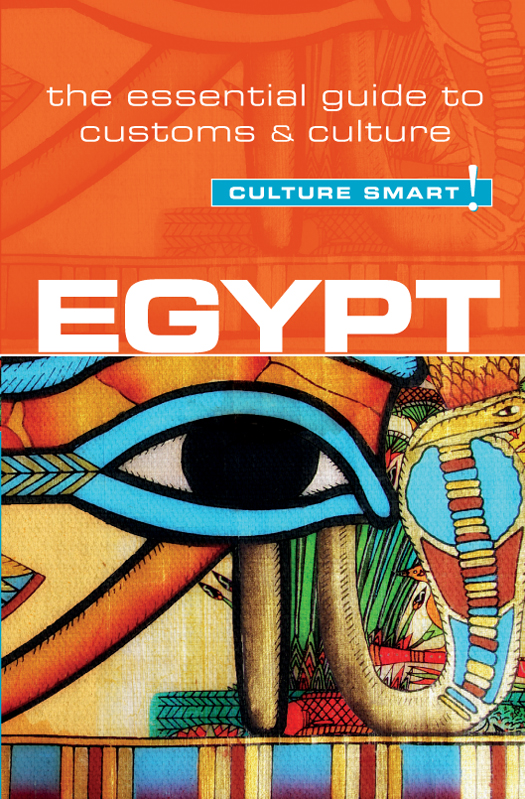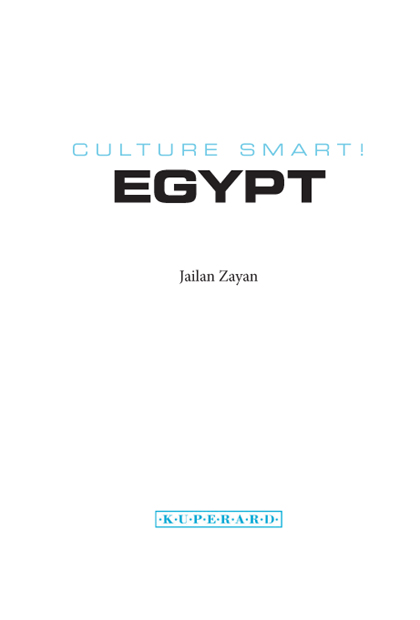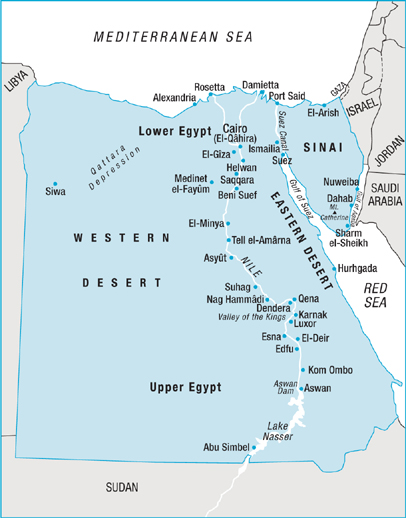For more information in the USA write to Special Markets/Premium Sales, 1745 Broadway, MD 62, New York, NY 10019, or e-mail .
In the United Kingdom contact Kuperard publishers at the address below.
eISBN: 978-1-85733-672-6
British Library Cataloguing in Publication Data
First published in Great Britain
by Kuperard, an imprint of Bravo Ltd
59 Hutton Grove, London N12 8DS
Tel: +44 (0) 20 8446 2440 Fax: +44 (0) 20 8446 2441
www.culturesmart.co.uk
Series Editor Geoffrey Chesler
Design Bobby Birchall
Cover image: Reproduction of a painting on parchment of the Eye of Horus, the ancient Egyptian symbol of protection, royal power, and good health. Fotolia
The photograph on is reproduced by permission of the Eardley family.
Images on by permission of the Egyptian State Tourist Office, London.
Image on reproduced under Creative Commons Attribution-Share Alike [unspecified] license, Zerida.
Images on the following pages reproduced under Creative Commons Attribution-Share Alike 3.0 Unported license: Faris knight.
Images on the following pages reproduced under Creative Commons Attribution-Share Alike 2.5 Generic license: Przemyslaw
Blueshade Idzkiewicz.
Images on the following pages reproduced under Creative Commons Attribution-Share Alike 2.0 Generic license: Walter G. Rodriguez.
Copyright 2007, 2013 Kuperard
Revised and updated edition 2013
All rights reserved. No part of this publication may be reprinted or reproduced, stored in a retrieval system, or transmitted in any form or by any means without prior permission in writing from the publishers.
Culture Smart! is a registered trademark of Bravo Ltd.
v3.1
About the Author
JAILAN ZAYAN is a British national of LibyanEgyptian origin. After graduating in law from the School of Oriental and African Studies, University of London, she took up a career in journalism, working for several news organizations. She moved to Egypt in 2000, where she reported for and contributed articles to international and Middle Eastern publications about the Arab world. She is currently Deputy Bureau Chief in Cairo for Agence France-Presse.
The Culture Smart! series is continuing to expand.
For further information and latest titles visit
www.culturesmart.co.uk
The publishers would like to thank CultureSmart!Consulting for its help in researching and developing the concept for this series.
CultureSmart!Consulting creates tailor-made seminars and consultancy programs to meet a wide range of corporate, public-sector, and individual needs. Whether delivering courses on multicultural team building in the USA, preparing Chinese engineers for a posting in Europe, training call-center staff in India, or raising the awareness of police forces to the needs of diverse ethnic communities, it provides essential, practical, and powerful skills worldwide to an increasingly international workforce.
For details, visit www.culturesmartconsulting.com
CultureSmart!Consulting and CultureSmart! guides have both contributed to and featured regularly in the weekly travel program Fast Track on BBC World TV.
contents
Map of Egypt
introduction
To many, the idea of Egypt conjures up a picture of the great pyramids and sphinx towering over the empty desert. But these monuments are merely the best known of many treasures left by the remarkable civilization of Ancient Egypt. For thousands of years the fertile banks of the Nile have been home to human settlement, and throughout its history Egypt has exchanged influences with the many different cultures it has encountered. Greeks, Romans, Persians, and Arabs have all left their mark on modern Egyptian society in the form of an astonishing legacy of temples, churches, and mosques.
At first sight, modern-day Egypt is an unruly and chaotic place, a cacophony of sounds, an overload of smells, and a visual theater, all of which can be taxing on the senses. Ancient church domes and medieval minarets share the same space with fast-food chains and Internet cafs.
The country that has inspired conquerors, academics, and artists is home to 82 million people, who call it Omm Eddunia, Mother of the World. It is the people who are Egypts true wealth. They are by nature friendly, cheerful, warm and hospitable, renowned for their sense of humor, and also extremely stubborn and proud. Good personal relations are at the core of the Egyptian value system. People are more important than time or money.
As in many developing countries, only certain aspects of this traditional and deeply conservative society have been affected by modernization. One can pay telephone bills on the Internet, though more than half the population is illiterate. Televisions in fashionable cafs play daring music videos, with the call to prayer booming from loudspeakers five times a day. In Egypt each individual finds his or her way of coping with change, while trying to uphold traditional values.
This new edition of Culture Smart! Egypt reveals a country in the throes of change. The revolution that started in Cairos Tahrir Square in 2011 was largely secular, but the the countrys political and social identity has yet to be defined.
This book explores the codes and paradoxes of Egyptian life. It outlines the countrys history and shows the forces that have shaped its sensibility. It explains values and attitudes, and guides you through local customs and traditions. It opens a window into the private lives of Egyptians, how they behave at home, and how they interact with foreign visitors. It offers practical advice, from how to make friends to avoiding faux pas.
Culture Smart! Egypt sets out to make that first trip as rich as possible, to take you beyond the clichs to the real people. Welcome to Egypt, Ahlan wa Sahlan!
Key Facts
| Official Name | Arab Republic of Egypt | Egypt is a member of the Arab League and the African Union. |
| Capital City | Cairo | Population approx. 15 million |
| Main Cities | Alexandria, Port Said, Suez, Asyt |
| Population | 82 million | Population growth rate 1.75% (2006 est.) |
| Ethnic Makeup | Egyptian 98%; Berber, Bedouin, and Beja 1%; Greek, Armenian, and other European 1% |
| Age Structure | 0-14 years: 32.6% 15-64 years: 62.9% 65 years and over: 4.5% |
| Area | 387,000 sq. miles (1,001,000 sq. km) |
| Geography | Situated at northeast corner of Africa. Bordered by Libya, Sudan, Israel, and Gaza | Four regions: Delta and Nile Valley, Western Desert, Eastern Desert, Sinai Peninsula |
| Terrain | Desert plateau interrupted by Nile valley and delta | The Nile flows through the country, dividing at Cairo to form the Delta. |


